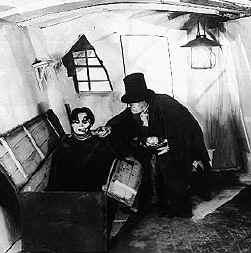This Friday morning, Turner Classic Movies is running a mini-marathon of the movies of director William Dieterle (all times Central):
5:00 A.M. A Midsummer's Night Dream (1935)
7:30 A.M. The Story Of Louis Pasteur (1935)
9:00 A.M. The Life Of Emile Zola (1936)
11:00 A.M. Juarez (1939)
1:15 P.M. Doctor Ehrlich's Magic Bullet (1940)
3:15 P.M. Kismet (1944)
5:30 P.M. Portrait of Jennie (1948)
Of this batch, I'd recommend catching Pasteur, Zola, and Doctor Ehrlich, but these are movies of a genre that I like, the underdog dismissed by the general population and only the protagonist's faith in his cause keeps him going. Pasteur's topic should be obvious and Paul Muni won the Best Actor Oscar that year for his portrayal. Zola deals with Emile Zola's charges against the French government (presented in his J'accuse) that it had falsely convicted Alfred Dreyfus, an officer in the French Army, of spying, sending Dreyfus to Devil's Island. Muni was nominated for Best Actor for this role, too, losing to Spencer Tracy for Captains Courageous. In Doctor Ehrlich, we are shown Ehrlich's struggle to find a cure for syphilis. It may not sound exciting, but it is never really slow. If nothing else, watch it for how the characters talk around the topic, especially its transmission.
A Midsummer's Night Dream is interesting for a few reasons. You get to see James Cagney performing Shakespeare, for instance, and Mickey Rooney, who would, in my opinion, evolve into a very annoying personality, uses that personality to create effect as "Puck," the reason and/or the tool for most of the problems. I think Dieterle's background as a German is best seen in this movie. Though the sets are full, there is still an Impressionistic look to the film. It isn't as stark as in The Cabinet of Dr. Caligari, as these pictures from Caligari show, but it is related to the same creative gene pool that gave us M.


Dieterle isn't a director that I think of as an important one, in fact, I originally thought that TCM was running a Paul Muni mini-marathon since the first films feature him. It was only when I looked at the schedule that I saw the focus must be on Dieterle. A quick Internet search shows that Dieterle's directorial career in Hollywood had an interesting start: He was hired to direct German versions of American films, but soon was allowed to direct original works.
The movies being shown, or at least the ones, I'm recommending are of the group, "The Kind They Don't Make Anymore." Mostly historical dramas, unlike those made today, they weren't made under the magnifying glass of countless self-appointed groups with historical accuracy in films their purpose. I think that this is where I differ from most people today, maybe most people always. Just because I'm told a movie is a biography, I don't necessarily accept it as such; as far as I'm concerned, it is a fictional story. However, if I find the topic interesting enough, I'll go find books on the subject to give me a more complete picture.
Why some people expect movies to present historically accurate accounts eludes me. Any time they are on, I could watch Yankee Doodle Dandy or Words and Music and enjoy them. Never in a million years would I expect either of these to present the full story and in both cases I read up on the protagonists, George M. Cohan in the first case, Rodgers and Hart in the second.
I truly believe that this ongoing desire for complete stories in movies is a remnant of the distrust foster during Watergate. Finding errors and half-truths in movies has moved from the realm of the geek to that of the self-important. Did pointing out that Ray wasn't a complete match for the life Ray Charles lived detract from what he did or the power of the movie? Does hinting that there are aspects less than perfect to Jim Braddock in Cinderella Man mean that the movie shouldn't be enjoyed for itself and judged on its own merits as a movie? I get the feeling that that is the implication.

